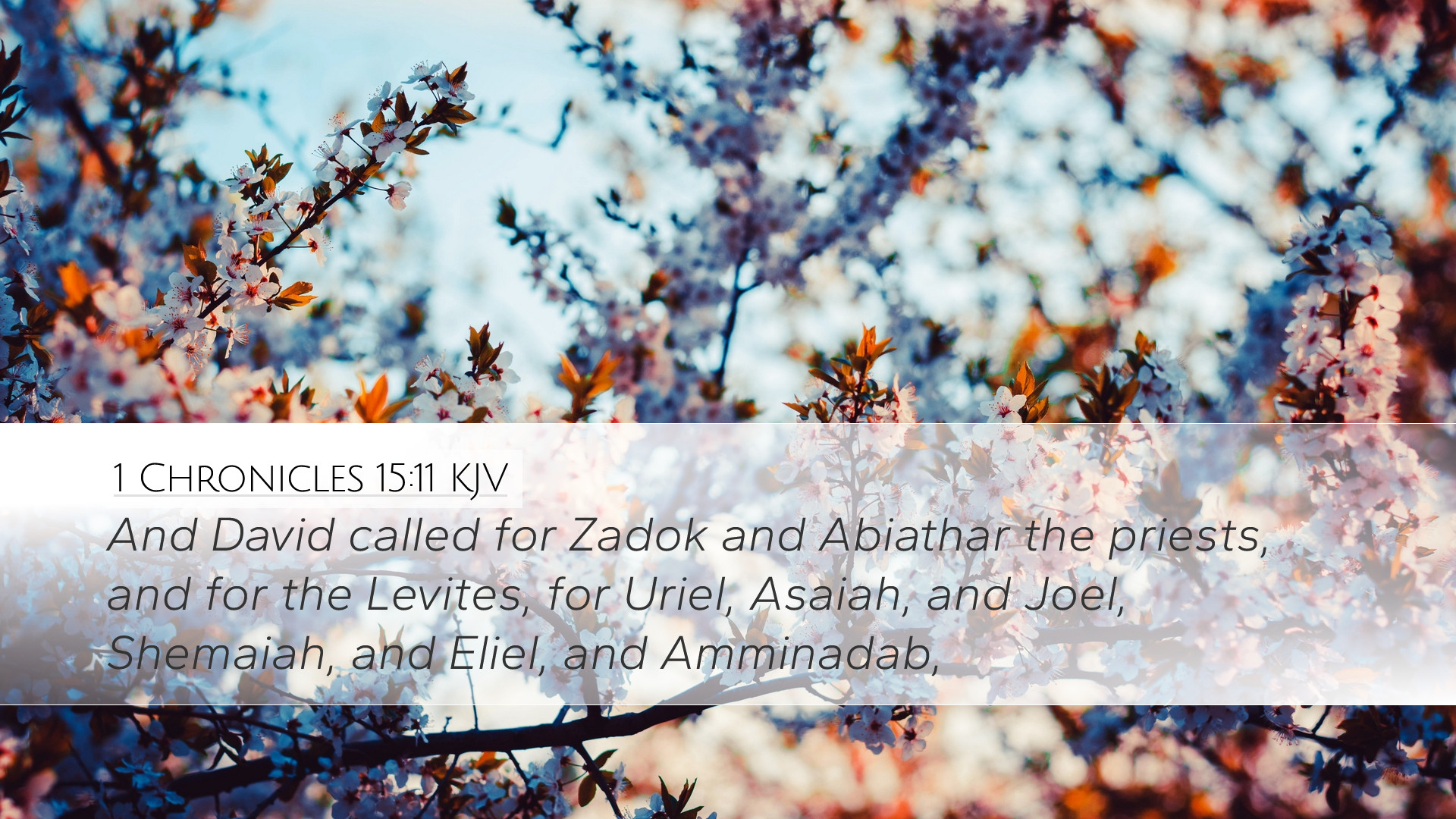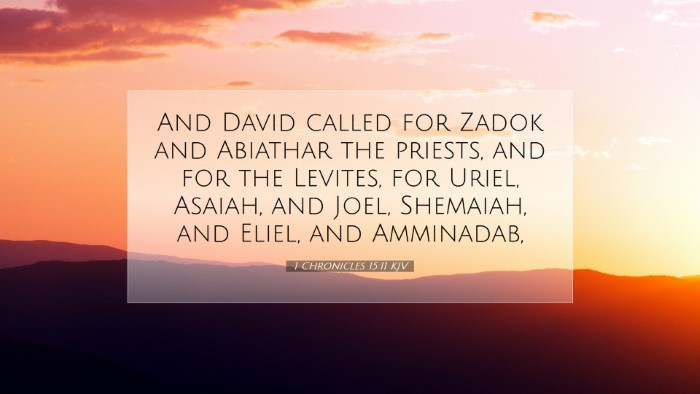Commentary on 1 Chronicles 15:11
Verse: 1 Chronicles 15:11 - "And David called for Zadok and Abiathar the priests, and for the Levites, for Uriel, Asaiah, Joel, Shemaiah, Eliel, and Amminadab."
Introduction
This verse is significant as it marks a pivotal moment in King David's efforts to bring the Ark of the Covenant to Jerusalem. It underscores the importance of the priesthood and the Levites in service to God and highlights the leadership responsibilities that David undertakes for the worship of Yahweh. Understanding this verse requires delving into the historical, theological, and practical implications of David's actions.
The Leadership of David
David's assembly of priests and Levites illustrates his recognition of the need for proper leadership in worship. As noted by Matthew Henry, leadership is essential in the administration of God’s ordinances. David did not act alone; rather, he involved key religious figures to ensure that the transition of the Ark was done in accordance with God’s laws.
The Role of Zadok and Abiathar
Albert Barnes emphasizes the role of Zadok and Abiathar as the principal priests during David's reign. Zadok had a lasting legacy as a priest loyal to David, particularly during Absalom's revolt. Abiathar, a descendant of Eli, served alongside Zadok, suggesting a partnership that symbolizes the unity of the priesthood despite the challenges faced. David’s choice to summon these priests highlights the significance of their roles in the spiritual life of Israel.
The Levites' Importance
In this verse, David not only calls upon the priests but also the priests’ assistants – the Levites. Adam Clarke notes that the Levites were chosen for service to assist in the worship at the tabernacle and later the temple. Their inclusion signifies the collective responsibility of the community in worship and confirms the importance of their roles as custodians of the Ark. The names listed bring attention to the various clans and their leaders, illustrating a structured approach to worship.
Contextual Analysis
The historical context of this verse is crucial. Before this moment, attempts to move the Ark had led to chaos and death due to improper handling (2 Samuel 6). David demonstrates a learned approach, seeking the guidance of those well-versed in the Law of God. This humility in seeking counsel is a profound lesson for contemporary leaders in faith communities.
- Proper Preparation: David needed to prepare the people spiritually and physically for the coming back of the Ark.
- Respect for God's Command: The seriousness of approaching God's presence is reflected in David's choice of priestly and Levite assistance.
- Community Involvement: David’s actions foster a sense of collective worship and unity among the people of Israel.
Theological Implications
This verse also brings forth significant theological themes, including the understanding of divinely ordained leadership and the necessity of reverence in worship. Matthew Henry observes that God’s presence signifies His covenant with His people, and His desired dwelling among them necessitates careful attention to holiness and worship principles.
- Leadership in Worship: God appoints leaders to guide His people in rightly approaching Him.
- Holiness of God: The Ark represents God's holy presence; thus, proper measures must be enacted to honor God in worship.
- Role of Worship Leaders: The priests and Levites embody roles that reflect their unique callings within the sacred community.
Practical Applications for Today's Church
For pastors, theologians, and students studying this passage, several practical insights emerge:
- Collaboration in Ministry: Like David, church leaders should actively seek collaboration and unity among congregational leaders to foster a vibrant worship experience.
- Preparation for Worship: There is a necessity for adequate preparation—spiritually and logistically—when facilitating collective worship.
- Reverence in Worship: Leaders are reminded to maintain a posture of reverence, acknowledging the holiness of God in their ministries.
- Community Responsibility: The church must recognize its collective responsibility in worship, where each member plays a role in honoring God’s presence.
Conclusion
1 Chronicles 15:11 serves as a reminder of the sacredness of worship and the critical role played by leaders in guiding their communities toward an encounter with God. The insights from public domain commentaries deepen our appreciation of this verse and challenge the contemporary church to reflect on its practices of worship, leadership, and community involvement. The life of King David serves as an exemplary model of seeking God through proper leadership and a united heart within His people.


